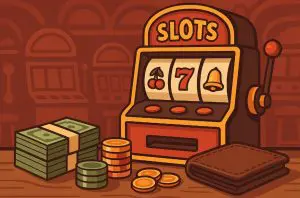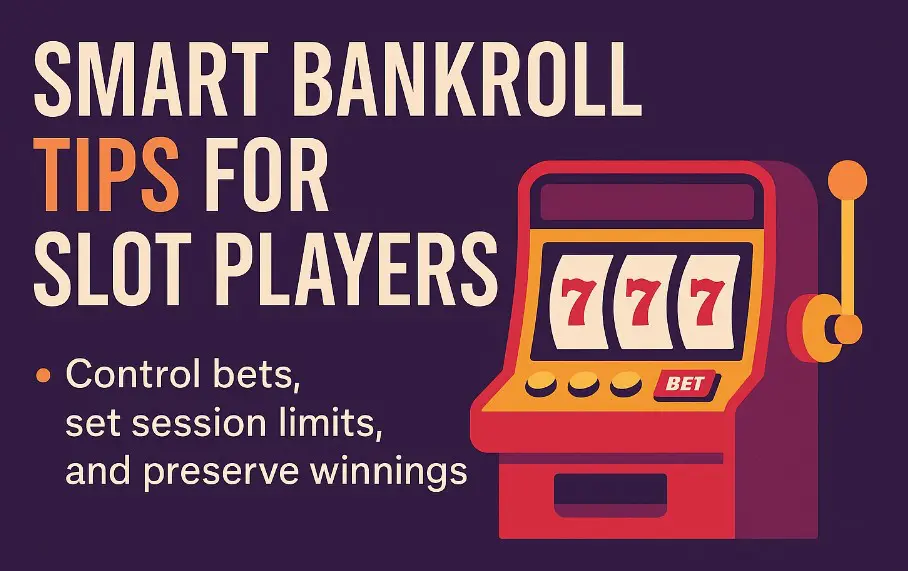Walking into a casino or loading up an online slot feels like stepping into a buzzing carnival. Lights flash, reels spin, and there’s that tiny hope in the back of your mind: maybe tonight’s the night. The catch is, slot machines can eat through cash quicker than a hungry teenager at an all-you-can-eat buffet. That’s where bankroll management steps in. It’s not about killing the fun. It’s about making the fun last longer, and maybe—just maybe—leaving with a little extra in your pocket.
What Is Bankroll Management for Slots?
Bankroll management is just a fancy way of saying “know how much you’re willing to lose before you even sit down.” Think of it like packing snacks for a road trip. You can stretch them across the whole drive or gobble them up in the first thirty minutes and regret it later.
When you play slots, you’re dealing with randomness. The math always tilts toward the casino, thanks to the house edge. Bankroll management doesn’t beat that math, but it gives you some guardrails. You decide your limits up front so you’re not making desperate decisions in the heat of the moment.
Why Slot Players Need Bankroll Management
I once watched a guy in a smoky Vegas casino feed $20 after $20 into a machine like it was some sort of ATM in reverse. He didn’t look like he was having fun; it was more like he was stuck in a trance. Without a plan, slots can pull you into that same cycle—always chasing, never stopping.
Slots don’t require skill like poker or blackjack. You can’t memorize charts or count reels. The only real control you have is how you manage your money and your time. That’s why bankroll strategy isn’t optional—it’s survival.
How to Set a Slots Budget
First rule of thumb: never gamble with money you wouldn’t blow on something frivolous. If losing the cash would sting, it’s not gambling money. A lot of players treat slots like movie night or concert tickets—a form of entertainment you budget for, not a potential payday.
Say you set aside $400 for the month. Break that into smaller piles. Four $100 sessions, or even eight $50 ones. Once you burn through one pile, you’re done for the night. No raiding next week’s stash. It’s amazing how much calmer you feel when you know the loss was already “priced in.”
Determining Your Bet Size and Session Limit
Bet sizing is where the rubber meets the road. Go too big, and your bankroll vanishes before you’ve even ordered a drink. Go too small, and you might feel like you’re nibbling without tasting the game. A decent rule is the 1% approach: never bet more than 1% of your bankroll on a single spin. With a $200 session bankroll, that means $2 per spin max.
Session limits are like curfews. Maybe you walk in saying, “I’ll quit if I’m down $75” or “If I double my starting cash, I’m cashing out.” Sure, it feels silly when you’re on a hot streak and walking away, but it feels worse to ride that streak back down to zero.
Tips To Preserve Your Winnings
There’s a trick I picked up from an older woman I met at a casino in Reno. She always pulled her original buy-in the moment she doubled it. Her line was, “I play with the casino’s money, not mine.” It stuck with me.
Another method: split your winnings in half. Cash one half out right away, play with the rest. That way, even if you blow the second half chasing a bonus round, you’re not walking away completely empty-handed.
Managing Win/Loss Limits
Win and loss limits are boring in theory but life-saving in practice. Let’s say you start with $100. You might set a loss limit of $50—once you’re down that much, you’re done. On the flip side, maybe your win limit is $200. If you reach it, you cash out and go grab dinner.
What gets people in trouble is ignoring these limits because “the machine feels ready.” That’s gambler’s fallacy talking. Machines don’t get hot or cold—they just spin. Limits protect you from your own optimism.
Recommended Strategies for Slot Players
Beyond bankroll, game selection makes a difference. A slot with a 97% return to player (RTP) doesn’t sound exciting, but over time it’s kinder to your budget than one at 92%. It’s like picking gas stations—some siphon more from you than others.
Volatility is another factor. Low-volatility slots keep you entertained with frequent small wins. High-volatility ones? They’re rollercoasters—long dry spells followed by the occasional big payout. If you’re running a small bankroll, stick to the gentler rides.
Progressive jackpots are tempting, sure. But they’re like lottery tickets. Great for a thrill, terrible for steady bankroll play. Sprinkle them into your sessions but don’t build your whole budget around them.
Common Bankroll Mistakes and How to Avoid Them
I’ve seen people double their bets after every loss, convinced they’re “due.” That’s the fastest way to drain your bankroll. Others treat winnings like Monopoly money, shoving it all back into the machine without a second thought.
Biggest mistake of all? Mixing gambling money with daily expenses. Once you pull out the credit card or tap into rent money, you’ve crossed a line. The fix isn’t complicated: separate your funds, stick to your limits, and don’t let desperation write the rules.
Responsible Gambling: Staying Safe
At the end of the day, bankroll management is about more than math. It’s about keeping your gambling fun instead of stressful. Most casinos and online platforms now offer tools like deposit caps, cooling-off timers, and even full self-exclusion options. Use them. Nobody at the bar is keeping score of how disciplined you are.
If you ever catch yourself hiding your play from friends, feeling angry after losses, or blowing through money you truly need, it’s time to step back. Slots should be entertaining, not damaging. Walking away is always an option, and often the smartest one.
Frequently Asked Bankroll Management Questions
How much should I bring for a night of slots?
Enough that you’d be fine if it disappeared. For some folks, that’s $50. For others, maybe $200. Think of it like budgeting for dinner and drinks—not a down payment on a car.
Should I bet the maximum every time?
Not unless your bankroll can handle it. Some games require max bets for jackpots, but if max spins make your stomach clench, drop down. Fun lasts longer that way.
What’s the best way to avoid chasing losses?
Write your stop-loss on a sticky note if you have to. Once you hit that number, step outside, grab a snack, or just call it a night. Chasing losses is like quicksand—the harder you fight, the deeper you sink.
Do higher RTP slots really make a difference?
Over one evening? Probably not. Over months or years? Absolutely. It’s like getting a slightly better gas mileage car. Doesn’t feel huge at first, but long-term it saves you plenty.
Is online slot bankroll management different from in-person casinos?
The math’s the same, but online makes it easier to overspend. A click here, a deposit there—it adds up. Set deposit limits before you start, and keep snacks at home so you’re not “buying just one more spin” at 2 a.m.


